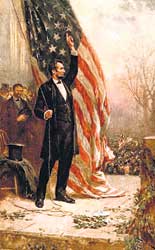
Abraham Lincoln (1809-1865)Abraham Lincoln was the 16th President of the United States and one of the great American leaders. His presidency was dominated by the American Civil War. Abraham Lincoln was born on February 12, 1809 near Hodgenville, Kentucky. He was brought up in Kentucky, Indiana and Illinois – his parents were poor pioneers and Lincoln was largely self-educated. In 1836, he qualified as a lawyer and went to work in a law practice in Springfield, Illinois. He sat in the state legislature from 1834 to 1842 and in 1846 was elected to Congress, representing the Whig Party for a term. In 1856, he joined the new Republican Party and in 1860, he was asked to run as their presidential candidate.
In the presidential campaign Lincoln made his opposition to slavery very clear. His victory provoked a crisis, with many southerners fearing that he would attempt to ban slavery in the South. Seven southern states left the Union to form the Confederate States of America, also known as the Confederacy. Four more joined later. Lincoln vowed to preserve the Union even if it meant war. Fighting broke out in April 1861. Lincoln defined the Civil War as a struggle to save the Union but in January 1863 he issued the Emancipation Proclamation, which freed all slaves in areas still under Confederate control. This was an important symbolic gesture that identified the Union's struggle as a war to end slavery. In the effort to win the war, Lincoln assumed more power than any president before him, declaring martial law and suspending legal rights. He had difficulty finding effective generals to lead the Union armies until the appointment of Ulysses S. Grant as overall commander in 1864. On November 19, 1863 Lincoln delivered his famous ‘Gettysburg Address’ at the dedication of a cemetery at the site of the Battle of Gettysburg, a decisive Union victory that had taken place earlier in the year. In 1864, Lincoln stood for re-election and won and, in his second inaugural address, he was conciliatory towards the southern states. On April 9, 1865, the Confederate General Robert E. Lee surrendered, and the war was effectively over. It had lasted for more than four years and 600,000 Americans had died. Less than a week later, Lincoln was shot in Ford's Theatre in Washington D. C. and died the next morning, April 15, 1865. His assassin, John Wilkes Booth, was a strong supporter of the Confederacy. |
|| Front
Page | News
| Editorial
| Columns
| Sports
| Plus
| Financial
Times | International
| Mirror
| TV
Times | Funday
Times || |
| |
Reproduction of articles permitted when used without any alterations to contents and the source. |
© Copyright
2007 | Wijeya
Newspapers Ltd.Colombo. Sri Lanka. All Rights Reserved. |
